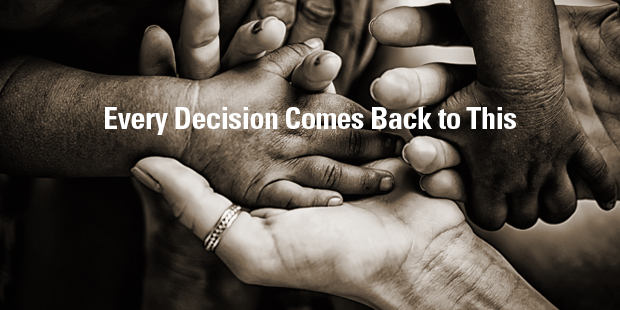
Every Decision Comes Back to This
Editor’s Note: During our August focus on Guest Experiences, we are honored to have some of the best voices in the world of Customer Experience provide guest posts for the Vision Room. As you read the content below, simply think “Guest” in terms of the “customer” the author is talking about – and you will benefit from the knowledge and expertise of these great minds.
I’m honored to be the keynote speaker later this year at Office Pride, a franchisor of commercial cleaning service companies. All of the franchisees will be attending their annual meeting to network and learn about the latest and greatest opportunities happening in their industry. My job is to talk to them about customer service.
As part of my homework, Todd Hopkins, their CEO, shared the Office Pride Culture book. As I was reading it, I came across a concept worth sharing. While Office Pride has created a great set of core values, Todd describes them as decision filters. He writes, “Our core values filter the outcome of what we, either impulsively or mindfully, decide to do.”
Core values are what an organization believes and stands for. These are the principles and beliefs that guide an organization – and the employees of that organization. Many organizations’ core values include words like honesty and integrity. Office Pride’s core beliefs and values are as follows:
- Honor God
- Always Do What is Right
- Increase Brand Value
- Demonstrate Honesty, Integrity, and Hard Work Ethic
- Total Customer Satisfaction
- Go the Extra Mile
- Persevere with a Servant’s Attitude
- Accountability to Commitments
The key for core values to work is to keep them in front of you, memorize them, and be conscious of how they tie into your daily behavior with your customers and employees. Just writing them down without acting on them is simply a writing assignment.
Tony Hsieh, the CEO of Zappos, came up with ten core values for his company. In his book, Delivering Happiness: A Path to Profits, Passion, and Purpose, Hsieh says he hires for those core values. He will also fire for a lack of any of the core values. That’s how important they are to the health of his organization.
It was Tony Hsieh’s book that inspired Hopkins to write his own culture book, which is a great exercise for an organization to consider. This short 84-page book devotes a chapter to each of his eight core values, supported by examples of how Office Pride employees and franchisees live by them.
So, back to Mr. Hopkin’s concept of core values being a filter. If you are working for a company or going to work for a company, take time to understand their core values. Do they align with what you believe in? Can you live by these values? Is this the culture that you want to be a part of? If the answer is yes, then let the values be the natural filter that guides the way you perform and treat others.
Want to know more about Guest Experiences at your church? Let’s talk! Connect with an Auxano Navigator here.

Tags: Church Guest Experience, Core Values, Guest Experiences, Shep Hyken, Values












